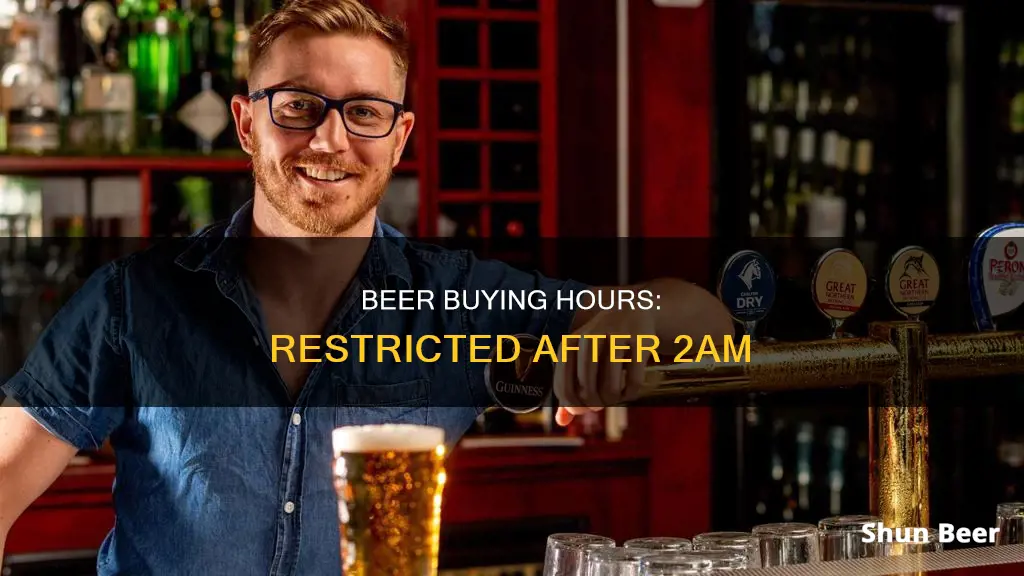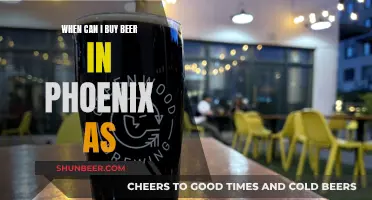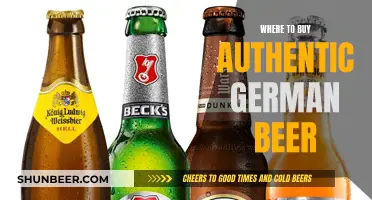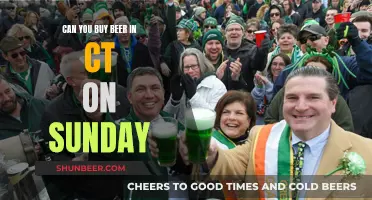
Alcohol laws vary across the United States, with some states and counties imposing stricter regulations than others. In some places, you may not be able to buy beer after 2 am due to local laws that restrict alcohol sales during certain hours of the day or on specific days of the week. These laws are often known as blue laws and are typically enacted to prevent drunk driving, reduce alcohol-related harm, and maintain public order. However, the specific rules can differ significantly depending on your location, so it's always a good idea to check the local laws before heading out to purchase alcohol.
| Characteristics | Values |
|---|---|
| Location | This varies across the United States, with different states and counties having different laws. |
| Time | In most states, beer cannot be bought after 2 am, with some states stopping sales at midnight or 1 am. |
| Day | Some states have restrictions on buying beer on Sundays, with some prohibiting sales before noon or at all on this day. |
| Type of Alcohol | Some states differentiate between beer, wine, and spirits in their laws. |
| Type of Store | Some states differentiate between the types of stores that can sell alcohol, with some only allowing liquor stores to sell spirits, for example. |
| Other | Some states have additional laws, such as Alabama's 6% ABV cap on beer sales. |
What You'll Learn

Alcohol laws vary across the United States
Alcohol laws vary significantly across the United States, with each state and territory having the power to regulate intoxicating liquors within their jurisdiction. These laws govern the production, sale, distribution, and consumption of alcohol. While the 21st Amendment repealed national prohibition, it gives individual states the control to decide whether to allow the sale and importation of alcohol, as well as how to distribute and possess it within their borders.
In terms of purchasing alcohol, the laws can differ based on the type of alcohol, the day of the week, and the specific county or city. Some states restrict the sale of liquor to liquor stores, allowing only beer and wine to be sold in grocery stores. Additionally, certain states have \"dry counties\" where alcohol sales are prohibited altogether. For example, Florida establishments are not allowed to sell, serve, or permit the consumption of alcoholic beverages between midnight and 7 a.m., but some cities within the state allow purchases as late as 3 a.m. Arizona, on the other hand, permits alcohol sales between 6 a.m. and 2 a.m. every day of the year.
The minimum legal drinking age is uniform across the United States, set at 21 years by the Federal Uniform Drinking Age Act of 1984. However, there are limited exceptions to this rule, such as religious activities or consent by a parent or guardian. These exceptions vary by state and are often restricted to specific locations, like private residences.
The variation in alcohol laws across the United States can be attributed to the combination of federal, state, and local laws that shape the role of alcohol in the country. While some states offer local governments control over alcohol policy development, others manage it at the state level. This results in a complex landscape of regulations that can change at any time, making it essential for both consumers and businesses to stay informed about the laws in their specific state and jurisdiction.
Buying Beer on Sundays in Guntersville, Alabama: What's Allowed?
You may want to see also

In some places, you can buy alcohol 24/7
In the United States, the Twenty-first Amendment grants each state and territory the power to regulate intoxicating liquors within their jurisdiction. As such, laws pertaining to the production, sale, distribution, and consumption of alcohol vary significantly across the country. While some states have a cut-off time for alcohol sales, others allow 24/7 purchases.
For instance, in Nevada, alcohol sales are allowed any hour of the day, any day of the year, unless you're in the township of Penaca, which is dry. In Louisiana, some areas have 24-hour bars, such as in the New Orleans and Lake Charles metro areas, and in Cameron Parish. In Mississippi, while there are many dry counties, some cities within these dry counties have voted in beer sales, and coastal casinos provide free alcohol 24/7.
In Alabama, twenty-six of the state's sixty-seven counties do not allow alcohol sales, yet possession and consumption remain legal within those counties. However, of the twenty-six "dry" counties, twenty-three have at least one "wet" city, and within those twenty-three counties, there are forty-three wet cities.
In Arizona, a large percentage of the land area falls under Indian reservations, which have liquor laws that are considerably more restrictive than state law, with some even prohibiting alcohol sales entirely.
In the United Kingdom, the Licensing Act of 2003 introduced 24-hour drinking in England and Wales, and there are now over 4000 shops with 24-hour alcohol licenses. However, this law does not apply in Scotland, so there are no 24-hour off-licenses there.
Vertical IDs: Beer Buying Confusion and Legal Consequences
You may want to see also

In some states, you can't buy alcohol before noon on Sundays
Alcohol laws vary widely across the United States, with some states and counties imposing more restrictions than others. In some states, you can't buy alcohol before noon on Sundays.
In Texas, for example, a change in state law now allows Texans to legally buy beer and wine at stores starting at 10 a.m. on Sundays. Previously, grocery and convenience stores had to wait until noon. During weekdays, stores can sell beer and wine from 7 a.m. until midnight Monday through Friday and from 7 a.m. Saturday until 1 a.m. Sunday. The law only applies to beer and wine; liquor is still not allowed to be sold on Sundays, and liquor stores must remain closed.
In Michigan, you can buy alcohol on Sundays starting at 7 a.m. in stores and restaurants that are permitted to sell alcohol. However, some stores don't sell alcohol at all on Sundays.
These types of laws are often referred to as "blue laws," which are laws that restrict or ban some or all activities on specified days, particularly Sundays. While most blue laws have been repealed in the United States, many states continue to impose tighter restrictions on the sale of alcoholic drinks on Sundays.
The justification for these restrictions is often based on public health and safety concerns and curbing excessive alcohol consumption, although historically, the origin of blue laws is partially rooted in religion, specifically the Christian tradition of observing Sunday as a day of rest.
Sunday Beer Run: Can HEB Help?
You may want to see also

In some states, you can buy alcohol from a grocery store
In the United States, the Twenty-first Amendment to the United States Constitution grants each state and territory the power to regulate intoxicating liquors within their jurisdiction. As such, laws pertaining to the production, sale, distribution, and consumption of alcohol vary significantly across the country.
Some states allow the sale of alcohol in grocery stores, but the specific rules around this vary. For example, in Nebraska, you cannot purchase liquor until noon, whereas in Florida, there are no time restrictions on liquor sales, but you can only purchase liquor from liquor stores.
In some states, grocery stores are prohibited from selling liquor all day on Sunday, such as in West Virginia. In other states, such as California, there are restrictions on the display of alcohol within a certain distance of the cash register if the store also sells motor fuel.
In Utah, Colorado, Kansas, Oklahoma, and Minnesota, grocery stores are only permitted to sell beer, and this must be below a certain ABV percentage. In Oklahoma, beer sold in grocery stores must be sold at room temperature.
In New Jersey, grocery chains are only allowed two liquor licenses for the entire state, meaning that only two locations for each chain can sell beer in their stores.
In Tennessee, Kentucky, Alabama, Mississippi, New York, and Connecticut, beer can be sold in grocery stores, but there are some exceptions and additional rules to be aware of. For example, in Kentucky, there are "wet", "dry", and "moist" counties, and Alabama and Mississippi also have several dry counties.
In Louisiana, liquor sales are allowed in grocery stores, but individual cities, towns, and villages may disallow it. For example, Shreveport does not allow hard liquor sales in grocery and other non-liquor store outlets, whereas Bossier City does.
In summary, the laws around the sale of alcohol in grocery stores vary widely across the United States, and it is important to check the specific rules for each state, and sometimes even for each county or city within a state.
Buying Beer: Age Verification and Alcohol Purchases
You may want to see also

In some states, you have to buy alcohol from a liquor store
In the United States, the laws regarding the sale and consumption of alcohol vary significantly from state to state. Some states have more restrictive laws than others, and these are known as control states or Alcoholic Beverage Control (ABC) states. In these states, the government intervenes to control the sale and distribution of alcohol, either at the wholesale level or by limiting sales to state-run ABC liquor stores.
There are 17 control states in the US, including Alabama, Idaho, Iowa, Maine, Michigan, Mississippi, Montana, New Hampshire, North Carolina, Ohio, Oregon, Pennsylvania, Utah, Vermont, West Virginia, and Wyoming. In these states, the state government controls at least one aspect of alcohol sales, and the number of stores licensed to sell alcohol is limited. This can make it more challenging for new breweries and distilleries to get their products on shelves, and the selection available is often more restricted than in "open" states.
In Alabama, Idaho, New Hampshire, North Carolina, Pennsylvania, Utah, and Virginia, the sale of alcohol is directly controlled through ABC-licensed liquor stores. This means that private businesses are not allowed to buy and sell alcohol as they are in "open" states, and must instead go through state-run package stores. In these states, liquor stores are generally closed on holidays and have limited hours on Sundays. Additionally, discounts and promotions are not allowed, and there may be restrictions on inventory levels.
The remaining control states, including Iowa, Maine, Michigan, Mississippi, Montana, Ohio, Oregon, Vermont, West Virginia, and Wyoming, allow alcohol to be sold in private outlets while maintaining control at the distribution or wholesale level. This means that while private retailers can sell alcohol, the state still determines what products will be sold and sets minimum prices.
It is important to note that laws can vary even within a state, as individual counties or municipalities may have their own regulations regarding alcohol sales. For example, in Florida, there is no statewide restriction on alcohol sales after 2 am, but some cities have their own laws that prohibit the sale of alcohol after midnight. Similarly, while Tennessee is an "open" state, it has some dry counties where alcohol sales are prohibited altogether. Therefore, it is always important to check the local laws and regulations when purchasing or consuming alcohol in a particular area.
Best Places to Buy Beer in Virginia
You may want to see also
Frequently asked questions
The laws regarding alcohol sales vary across different states in the U.S. Some states restrict the sale of alcohol between midnight and 7 a.m., while others allow sales until 2 a.m. or even later. These laws are often determined by local jurisdictions and can change over time, so it's important to check the specific laws in your area.
Yes, there are some exceptions to the rule. For example, in some states, like Florida, counties can override the state restriction and allow 24-hour alcohol sales. Additionally, in some cities, alcohol can be purchased as late as 3 a.m. or even later in certain establishments.
Selling alcohol outside of the designated hours can result in legal consequences for the establishment and its employees. These consequences can include criminal and civil liabilities, as well as fines and the loss of licenses to sell alcohol. It's important for businesses and individuals to be aware of and comply with the local laws to avoid these penalties.







